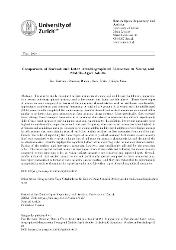| dc.contributor.author | Ece, Berivan | |
| dc.contributor.author | Demiray, Burcu | |
| dc.contributor.author | Öner, Sezin | |
| dc.contributor.author | Gülgöz, Sami | |
| dc.date.accessioned | 2020-12-19T13:44:47Z | |
| dc.date.available | 2020-12-19T13:44:47Z | |
| dc.date.issued | 2019 | |
| dc.identifier.issn | 1304-4680 | en_US |
| dc.identifier.issn | 2602-2982 | en_US |
| dc.identifier.uri | https://hdl.handle.net/20.500.12469/3598 | |
| dc.identifier.uri | https://doi.org/10.26650/SP2018-0037 | |
| dc.identifier.uri | https://search.trdizin.gov.tr/yayin/detay/357853 | |
| dc.description.abstract | The current study examined earliest memories of young and middle-aged adults in comparison to a recent autobiographical memory and a free-report one from any life phase. These three types of memories were compared in terms of their memory characteristics such as vividness, emotionality. importance, confidence, and rehearsal frequency. A total of 319 young (18-30 years) and 112 middle-aged (40-65 years) adults completed the online survey. Results showed that earliest memories were rated either similar to or lower than later memories in their memory characteristics. More specifically. they received lower ratings than free-report memories in all memory characteristics whereas they did not significantly differ from recent memories only in importance and emotionality. In addition, free-report memories were highest in emotionality, importance and rehearsal frequency whereas recent memories were highest in vividness and confidence ratings. Compared to young adults, middle-aged adults provided higher ratings for all memory characteristics in general, and they further recalled earliest memories from an older age. Finally, the order of reporting the three types of memories (earliest memory first versus recent memory first) was examined with respect to its potential influence on memory characteristics and dating of the recalled memories. Results displayed no significant effect of the reporting order on memory characteristics. Dating of the earliest and free-report memories, however, was significantly affected by the reporting order. The mean age for earliest memories was higher when it was retrieved following the recent memory compared to the reporting order in which earliest memories are retrieved and reported first. Overall, results indicated that earliest memories arc not particularly special compared to later memories (e.g.. free-report memories) in terms of their memory characteristics, and they are vulnerable to experimental manipulation such as changing the reporting order just like other types of autobiographical memories. | en_US |
| dc.language.iso | eng | en_US |
| dc.publisher | Istanbul Univ | en_US |
| dc.rights | info:eu-repo/semantics/openAccess | en_US |
| dc.subject | Earliest memory | en_US |
| dc.subject | Age group differences | en_US |
| dc.subject | Midlife | en_US |
| dc.title | Comparison of Earliest and Later Autobiographical Memories in Young and Middle-Aged Adults | en_US |
| dc.type | article | en_US |
| dc.identifier.startpage | 45 | en_US |
| dc.identifier.endpage | 78 | en_US |
| dc.relation.journal | Studies in Psychology-Psikoloji Çalışmaları Dergisi | en_US |
| dc.identifier.issue | 1 | en_US |
| dc.identifier.volume | 39 | en_US |
| dc.department | Fakülteler, İktisadi, İdari ve Sosyal Bilimler Fakültesi, Psikoloji Bölümü | en_US |
| dc.identifier.wos | WOS:000473207300003 | en_US |
| dc.identifier.doi | 10.26650/SP2018-0037 | en_US |
| dc.institutionauthor | Öner, Sezin | en_US |
| dc.relation.publicationcategory | Makale - Uluslararası Hakemli Dergi - Kurum Öğretim Elemanı | en_US |
| dc.identifier.trdizinid | 357853 | en_US |
















